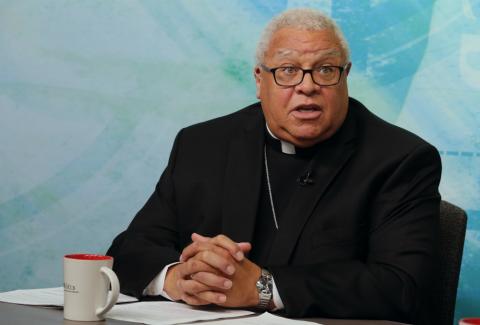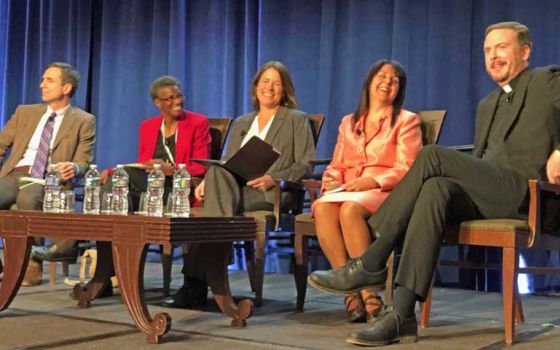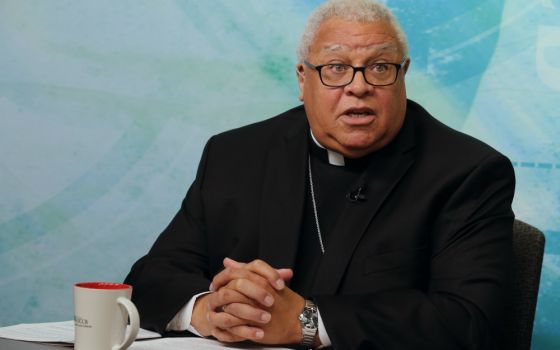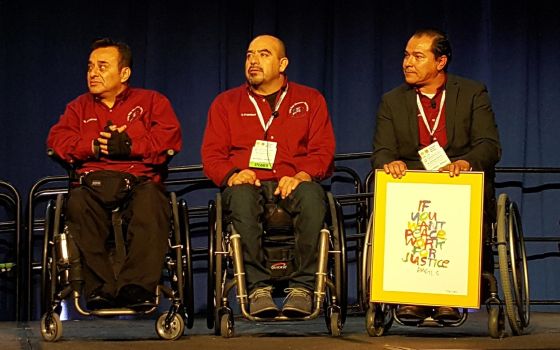
Bishop George Murry of Youngstown, Ohio, speaks during a video news conference Aug. 23 at the U.S. Conference of Catholic Bishops headquarters in Washington. (CNS/Bob Roller)
The chair of the bishops' new Ad Hoc Committee Against Racism charged that American Catholics have shown a "lack of moral consciousness on the issue of race" and urged bold action by the church to "break the silent complicity with the social evil of racism that has marred the past and continues to mar the present."
In a strongly worded address to Catholics involved in social ministry, Bishop George Murry of Youngstown, Ohio, traced the history of Catholic attitudes toward slavery, race and African-Americans.
While some progress has been made, "recent events in our country have questioned exactly how far we have come," Murray said in a Feb. 4 plenary address to the Catholic Social Ministry Gathering.
"As the global church has championed global dignity and equality, why does it appear that the church in America has been incapable of taking decisive action and incapable of enunciating clear-cut principles regarding racism?" he asked.
As chair of the new committee, Murry said he is "committed to the goal of helping the church become a consistent and productive voice in eradicating this plague." Among the committee's plans are an ecumenical gathering of religious leaders later this month, listening sessions around the country, and a "national conversation on race" in parishes, schools and other Catholic institutions.
These events will be in conjunction with the U.S. bishops' new pastoral letter on racism, "which is being finalized, even as we speak," he said.
But the bishops' own analysis of their previous pastoral letter, "Brothers and Sisters to Us," was that little had been accomplished since its release in 1979. On the letter's 10th anniversary, they found a "pathetic and anemic response from dioceses and archdioceses around the country" and "little or no impact on the majority of Catholics in the United States," Murry said.
A study on the 25th anniversary of the letter, in 2004, showed that only 18 percent of American bishops had issued statements condemning racism since 1979, and that Catholics' support for policies aimed at curbing racial inequality had diminished, Murry said.
"While racism is America's most persistent sin, it appears the American Catholic Church continues to be virtually silent about its significance in its seminaries, its parishes and in every other segment of the larger Catholic society," he said.
A panel that followed Murry's address included information about the "racial wealth gap," in which African Americans have only 10 cents of wealth for every $1 held by white Americans, according to research from the Federal Reserve Bank of St. Louis.
The wealth gap matters even more than the racial income gap, said Ray Boshara of the Archdiocese of St. Louis' Peace and Justice Commission. "It's huge and consequential," he said. "Lack of income means you don't get by, while lack of wealth means you don't get ahead."
Racial disparities also are evident in health and life expectancy, with blacks living 18 years fewer than whites in neighboring communities in St. Louis, according to a workshop presentation on "Responding to Racial Unrest: Lessons from Ferguson."
Advertisement
"Access to health care is not a privilege, it's a right," said Tamara Kenny, director of Advocacy and Community Engagement for Catholic Charities in St. Louis, which is trying to address the racial health gap in the archdiocese.
Wearing an "I love Ferguson" sweatshirt, Lynn Squires of the archdiocesan St. Charles Lwanga Center noted that while Pope Francis has called Catholics to go the periphery, "I live, I work, I worship in the periphery. We've had this periphery thing down a long time ago."
She added that African-Americans "are not a problem to be solved. We are the solution."
Representatives from the archdiocese reported that St. Louis Archbishop Robert Carlson has asked priests to preach about racism on the first Sunday of Lent this year.
Bishop Murry, in his plenary address, said Catholics cannot "sit on the sidelines and watch from afar," as many did during the Civil Rights Era.
"Today the Catholic Church in America must recognize that Christ wishes to break down the walls created by the evils of racism, whether that racism is displayed publicly for all to see, or buried deep in the recesses of our hearts," he said.
"If not, we are destined for history to continue to repeat itself, and once again, the church will be perceived as silent in the face of racism."
[Heidi Schlumpf is NCR national correspondent. Her email address is hschlumpf@ncronline.org. Follow her on Twitter @HeidiSchlumpf.]








